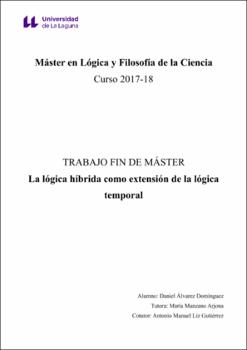La lógica híbrida como extensión de la lógica temporal
Author
Álvarez Domínguez, DanielDate
2021Abstract
El objetivo de este trabajo consiste en explicar el origen de la lógica híbrida a partir de la modal/
temporal para mostrar qué añade a ambos sistemas en la representación de información, porqué es
más potente que ellos y qué relación guarda con el lenguaje de correspondencia de la lógica de
primer orden. La lógica temporal permite la representación de información temporal en un sistema
lógico. Su creador fue Arthur Prior, cuya propuesta se basa en definir operadores temporales para
representar enunciados como “fue alguna vez en el pasado p”, “será alguna vez en el futuro p”, “ha
sido siempre en el pasado p” o “será siempre en el futuro p”. La evaluación de tales enunciados se
lleva a cabo en semánticas kripkeanas. Lógica temporal y lógica modal en consecuencia están
relacionadas. Sin embargo, la primera no tiene la capacidad de nombrar puntos concretos dentro de
un modelo, por ejemplo. La lógica temporal tampoco puede hacerlo al fundamentarse en ella. Pero
la lógica de primer orden sí puede mediante las constantes y la relación de identidad. La lógica
híbrida es el resultado de combinar la lógica modal con la lógica de primer orden para realizar tal
cosa. Abstract.
The aim of this paper is to explain the origin of Hybrid Logic from modal/temporal one to show
how much it contributes to the representation of formulae, why it is stronger than them and which
relation holds with first order correspondence language. Temporal Logic allows the representation
of temporal information in logical systems. Its origin goes back to Arthur Prior´s works, whose
proposal consists in defining temporal operators which can be applied to propositions to represent
sentences such as “p was sometime in the past”, “p will be sometime in the future p”, “p has always
been in the past” or “p will always be in the future”. The evaluation of such a sentences is carrying
out on Kripke semantics. Temporal Logic and Modal Logic are consequently related. However
Modal Logic is not able to name points inside models, for instance. And as Temporal Logic is based
on it, it cannot make such a thing neither. First Order Logic on the contrary does can through
constants and equality relation. Hybrid Logic is the result of combining Modal Logic and First
Order Logic to make that thing.





